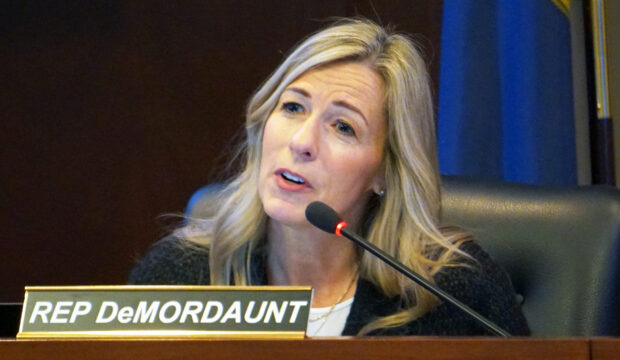A divided House Education Committee advanced a resolution Monday that authorizes a new legislative interim committee to study higher education funding during the offseason.

Pushed by Rep. Paul Amador, R- Coeur d’Alene, House Concurrent Resolution 34, is designed to undertake and complete a study of state funding for higher education “with the goal of making higher education more accessible and affordable for Idaho students.”
“Higher education presents great opportunities, and it also presents a great challenge for us right now,” Amador said.
Rep. Steve Berch, D-Boise, supported the bill after saying higher education affordability is a concern he’s heard from constituents since he first ran for the Legislature.
Rep. Bill Goesling, R-Moscow, and three other committee members voted against the resolution. Goesling, reflecting on his previous experience with the State Board of Education, said higher education funding and affordability are complex issues. He said the State Board, a state working group and Idaho’s college and university presidents are committed to working on the issue already. Goesling doubted that an interim committee would help, since legislators would have to balance running for re-election against committee work.
Chairman Lance Clow, R-Twin Falls, also urged Amador to update the fiscal note attached to the resolution to reflect the state’s costs for travel and other reimbursable expenses for committee members.
Reps. Judy Boyle, R-Midvale, Dorothy Moon, R- Stanley, Paul Shepherd, R-Riggins, and Goesling voted against the resolution. But the remaining Republicans and Democrats joined forces to pass it, 11-4.
HCR 34 next heads to the House floor with a recommendation it passes.
ISAT high school alternative
A resolution designed to consider replacing a high school assessment cleared its final legislative hurdle.
The House voted 68-0 to pass Senate Concurrent Resolution 120. Pushed by House Education Vice Chairman Ryan Kerby, R-New Plymouth, the nonbinding resolution encourages the State Board and State Department of Education to stop administering the Idaho Standards Achievement Test in 10th grade and instead use the SAT or ACT to measure math and English proficiency.
Kerby, the retired superintendent of his local school district, said students don’t try on the 10th grade ISAT test and, as a result, the data the test provides is worthless. Because students are already required to take a college entrance exam such as the SAT or ACT, dropping the ISAT would reduce the testing burden, Kerby said.
In Idaho, the state spends $1 million of taxpayers’ money to allow all juniors to take the SAT.
Even if the state drops the ISAT for high school students, Idaho schools would still administer the ISAT in third through eighth grade.
The resolution previously passed the Senate via a voice vote on Feb. 6.
Literacy intervention and accountability
Rep. Gayann DeMordaunt is pushing a new bill designed to add some accountability to Idaho’s multimillion-dollar reading initiative.

DeMordaunt’s new bill is modeled after legislation she pushed unsuccessfully near the end of the 2019 session.
It would take $3.2 million of the $26 million annual literacy initiative funding and seek a new request for proposals (RFP) process to gauge the effectiveness of literacy programs.
Under the bill, any literacy intervention tools that providers offer Idaho schools must:
- Focus on age-appropriate literacy skills that include phonological awareness, phonics, fluency, comprehension and vocabulary, at a minimum.
- Use an evidence-based intervention model.
- Include a parental engagement and involvement component that allows parents to participate in their child’s literacy intervention programs.
The bill would help the state address the efficacy of the literacy intervention tools by identifying multiple programs that meet the specifications listed in the RFP, DeMordaunt said.
Introducing the new bill clears the way for it to return to the committee for a full hearing.
Funding for classroom supplies
House Education introduced a bill Monday designed to have the state pick up a share of the costs teachers shoulder to prepare their classrooms and provide supplies.
Pushed by DeMordaunt, the bill would provide an unspecified, equal distribution of state funds to each Idaho K-12 classroom teacher.
If any funding is provided, teachers would be able to decide how to spend the money, DeMordaunt said.
“It seems like the right time for us be considering this funding,” she said.
However, neither Gov. Brad Little nor Superintendent of Public Instruction Sherri Ybarra proposed any funding for the bill.
DeMordaunt used a hypothetical example of providing $100 to all teachers, saying it would cost $1.6 million per year to provide such a stipend to Idaho’s 16,076 classroom teachers.
Introducing the bill clears the way for it to return to House Education for a full hearing. Even if the bill is signed into law, the Joint Finance-Appropriations Committee would need to approve funding for the program, otherwise no money would be available.
Senate passes teacher pipeline bills
The Senate approved two bills designed to address various aspects of Idaho’s teacher shortage.
- Senate Bill 1325 is a “grow your own” teacher development bill. Schools could use their training money to help a paraprofessional pursue a teaching certificate. Paraprofessionals could apply for a state Opportunity Scholarship to cover the costs of receiving a certificate. Both moves are “desperately needed,” said the bill’s sponsor, Boise Democratic Sen. Janie Ward-Engelking, in a state where some 850 teachers are working under an alternative authorization. This bill passed on a 24-11 vote.
- Senate Bill 1329 addresses career-technical teachers. It would move some 100 CTE instructors up on the teacher salary career ladder, at a $187,500 one-time cost. The bill also would streamline the certification process for CTE teachers. This bill passed on a 35-0 vote.
Both bills now go to the House.
Idaho Education News reporter Kevin Richert contributed to this story.
